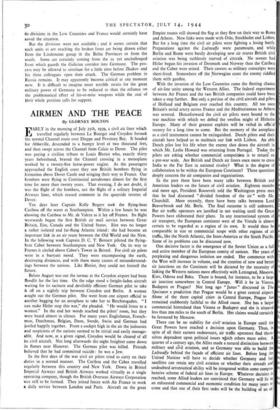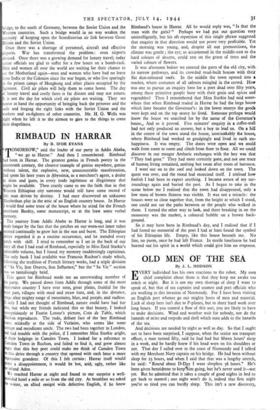AIRMEN AND THE PEACE
By. GLORNEY BOLTON
EARLY in the morning of July 25th, 1939, a civil air liner which travelled regularly between Le Bourget and Croydon forsook the normal Channel route over Dieppe and Pevensey Bay. It headed for Abbeville, descended to a bumpy level of two thousand feet, and then swept across the Channel from Calais to Dover. The pilot was paying a civilian tribute to Louis Bleriot who, exactly thirty years beforehand, braved the Channel crossing in a monoplane worked by a twenty-five horse-power engine. As the passengers approached the English coast they saw British bombers flying in formation above Dover Castle and winging their way to France. Our bombers were flying to Continental aerodromes almost for the first time for more than twenty years. That evening, I do not doubt, it was the flight of the bombers, not the flight of a solitary Imperial Airways liner, which roused comment in the quayside taverns of Dover.
Ten days later Captain Kelly Rogers took the flying-boat Caribou off the water at Southampton. Within a few hours he was showing the Caribou to Mr. de Valera as it lay off Foynes. Its flight westwards began the first British air mail service between Great Britain, Eire, Canada and the United States. Eire was no longer a rather isolated and far-flung Atlantic island : she had become an important link in an air route between the Old World and the New. In the following week Captain D. C. T. Bennett piloted the flying- boat Cabot between Southampton and New York. On its way to Foynes it circled above Cabot's Tower in Bristol. For civil air pilots were in a buoyant mood. Thcy were encompassing the earth, destroying distances, and with them many causes of misunderstand- ings between the nations. Like Bleriot, they could not foretell the future.
Before August was out the tarmac at the Croydon airport had been floodlit for the last time. On the edge stood a freight-laden aircraft waiting for its taciturn and devilishly efficient German pilot to take it off on a nightly trip between Croydon and Berlin. A woman sought out the German pilot. She went from one airport official to another begging for an aeroplane to take her to Berchtesgaden. "I can make Hitler stop this war," she pleaded. " He would listen to a woman." In the end her words reached the .pilots' room, but they were heard almost in silence. For many years Englishman, French- man, Dutchman, Belgian, Dane, Swede, Swiss and German had jostled happily together. From a cockpit high in the air the jealousies and suspicions of the nations seemed to be trivial and easily manage- able. And now, at a given signal, Croydon would be cleared of all its civil aircraft. Not long afterwards the night freighter came down in flames near Hanover. The German pilot was killed. Friends believed that he had committed suicide: he was a Jew.
In the first days of the war civil air pilots tried to carry on their duties in a normal manner. The Caribou and the Cabot travelled regularly between this country and New York. Down in Bristol Imperial Airways and British Airways worked virtually as a single operating company, though the British Overseas Airways Corporation was still to be formed. They joined forces with Air France to work a daily service between London and Paris. Aircraft on the great Empire routes still showed the flag as they flew on their way to Rome and Athens. New links were made with Oslo, Stockholm and Lisbon.
But for a long time the civil air pilots were fighting a losing battle. Preparations against the Luftwaffe were paramount, and while Berlin and Rome were busily developing new air routes British civil aviation was being ruthlessly starved of aircraft. No sooner had Hitler begun his invasion of Denmark and Norway than the Caribou and the Cabot were seized. Their careers as military conscripts were short-lived. Somewhere off the Norwegian coast the enemy riddled them with gunfire.
With the invasion of the Low Countries came the fleeting chance of air-line unity among the Western Allies. The federal experiment between Air France and the two British companies could have been taken a step further. But only a portion of the civil aircraft and pilots of Holland and Belgium ever reached this country. All too soon Britain's aerial artery across France and the Mediterranean to Athens was severed. Henceforward the civil air pilots were bound to the war machine with which we defied the swollen might of Hitlerite Europe. Many of' their greatest exploits will be veiled in offiCal secrecy for a long time to come. But the memory of the aeroplane as a civil instrument cannot be extinguished. Dutch pilots and their aircraft have helped us to maihtain our link with Lisbon. An able Dutch pilot lost his life when the enemy shot down the aircraft in which Mr. Leslie Howard was returning from Portugal. Today' the pilots are asking whether commercial competition is to return on a pre-war scale. Are British and Dutch air liners once more to cross India to the Far East in national rivalry? What is the degree of collaboration to be within the European Continent? These questions deeply concern the air companies and organisations.
In the past there have been many talks between British and American leaders on the future of civil aviation. Eighteen months and more ago, President Roosevelt told the Washington press men that he had discussed "divided freedom of the air" with Mr. Churchill. More recently, there have been talks between Lord Beaverbrook and Mr. Berle. The final outcome is still unknown. But air traffic operators are justified in not waiting until the Great Powers have elaborated their plans. In any international system of air transport, the European continent west of the Vistula is almost certain to be regarded as a region of its own. It would then be comparable in size or commercial scope with other regions of air traffic, like the North Atlantic, the Inter-America or the South Pacific. Some of its problems can be discussed now.
One decisive factor is the emergence of the Soviet Union as a full and active member of the European comity of nations. Her years of perplexing and dangerous isolation are ended. Her commerce with the West will increase in volume, and the creation of new and better air junctions on the Continent will be dictated by the necessity of linking the Western nations more effectively with Leningrad, Moscow, Kiev, Odessa and Baku. There is bound, for insttnce, to be a large air junction somewhere in Central Europe. -Will it be in Vienna, Budapest or Prague? Not long ago " Janus " discussed in The Spetator a prediction that Prague would be a great central airport Alone, of the three capital cities in Central Europe, Prague has remained stubbornly faithful to the Allied cause. She has a larger commercial hinterland than Vienna or Budapest and she is situated less than zoo miles to the south of Berlin. Her claims would certainly be favoured by Moscow.
There can be no stability for civil-aviation in Europe until the Great Powers have reached a decision upon Germany. Thus, in
spite of all their earnest endeavours, air traffic operators find them-
selves dependent upon political issues sitich others must solve. A quarter of a century ago, the Allies made a natural distinction between military and civil aviation, and so Germany was able to build the Luftwaffe behind the facade of efficient air lines. Before long the
United Nations will have to decide whether Germany and her satellites can retain any civil aviation or whether their aircraft and
undoubted aeronautical ability will be integrated within some compre*
hensive scheme of federal air lines in Europe. Whatever decision is reached, some Allied leaders are convinced that Germany wilt lie in an exhausted commercial and economic condition for many years re come and that one of their first tasks will be the building of an air • ridge, to the south of Germany, between the Soviet Union and the Western countries. Such a bridge would. in no way weaken the necessity of keeping open the Scandinavian air link between Great Britain and the Soviet Union.
Once there was a shortage of personnel, aircraft and effective airports. War has transformed the problem: even airports abound. Once there was a growing demand for luxury travel; today senior officials are glad to suffer for a few hours on a bomb-rack. \len and women all over the world are waiting for their chance to see the Motherland again—men and women who have had no leave omm India or the Colonies since the war began, or who live sparingly n the prison camps of Hongkong and other places occupied by the apanese. Civil air pilots will help them to come home. The day • f luxury travel and costly fares is far distant and may not return. it is not the day for which civil air pilots are waiting. They see • earer at hand the opportunity of bringing back the prisoner and the xile and forging the right links with the Soviet Union and the .orkers and ex-fighters of other countries. Mr. H. G. Wells was ight when he left it to the airmen to give to the things to come heir shapeliness.



























 Previous page
Previous page